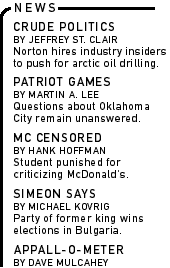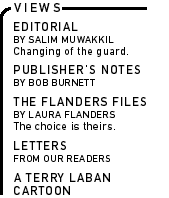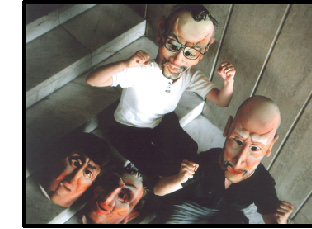

|

|

|

|
|
|
| |
|
|
|
Running through the center of Bulgaria's gritty capital is a yellow-brick road named "Czar Liberator" in honor of Russia's Alexander II, who helped end Ottoman occupation in the 19th century. Now Bulgarians have pinned their hopes on another czar from their past: Simeon II. Exiled in 1946 by the Communists, Simeon Saxe-Coburg has returned to Bulgaria triumphant thanks to the ballot box. On June 17 voters handed his two-month-old National Movement Simeon II (NMSII) a landslide victory in parliamentary elections. But is this 64-year-old blue blood really a white knight come to save his homeland, or a Wizard of Oz, all smoke, mirrors and impossible promises? Although Simeon reigned for just three years between the death of his father Boris III
Since the fall of Communism in 1989, Bulgaria's 8 million people have watched their East European neighbors make great strides forward, while their own economy has just begun to crawl. It was in a tailspin until 1997, when the right-wing Union of Democratic Forces (UDF) came to power and began major reforms. State enterprises have been privatized or closed, inflation has been tamed and the currency stabilized. GDP grew by 5.8 percent in 2000. But these reforms came at the cost of grinding poverty and social dislocation. Sky-high taxes go to servicing $10 billion in foreign debt. Unemployment officially stands at 18 percent, and inequality has climbed sharply. An average worker is lucky to earn $100 a month, while a few Bulgarians have grown very rich. "The current situation is not bearable," says Daniela Kolarova, director of Partners for Change, a Sofia-based organization that promotes civil society. "People are tired of waiting for improvement." Bulgarians are also sick of what media expert Ognian Zlatev describes as "blunt, obvious corruption" in their officials. Some politicians previously worked as agents for the communist-era secret police. Kickbacks are endemic. The UDF's former Deputy Prime Minister, Alexander Boshkov, earned the nickname "Mr. 10 Percent" from his involvement in murky privatization deals. Along came Simeon, an outsider with clean hands, a shining image, and connections with European royals and financiers. Cynics argue that his timing is perfect to harvest the fruits of the UDF's tough reforms. The NMSII has pledged to quickly raise living standards, overhaul the tax and legal systems, root out corruption, trim the state bureaucracy and increase salaries and pensions. The movement also plans to introduce microcredit schemes, including zero-interest loans for entrepreneurs and small businesses. Simeon says he will work to attract more foreign investors and continue Bulgaria's drive to join the European Union and NATO. Bulgarians seem to believe him: The NMSII garnered nearly 43 percent of the vote, a clear win over the UDF and the opposition Bulgarian Socialist Party. NMSII officials said they will seek to form a coalition government--most likely, analysts say, with the Movement for Rights and Freedoms, which represents Bulgaria's Turkish minority. Simeon hasn't said whether he plans to take an official post, and speculation is rampant over whether he covets the prime minister's job or plans to wait and run in the presidential election in the fall. Some theorize he wants to establish a constitutional monarchy. Bulgaria is in no shape to gamble on its future, and with continued
unrest and economic uncertainty in neighboring countries, economists
say even maintaining the current rate of growth will be a challenge.
Czar, wizard or jet-set business booster, Simeon has a lot of work
to do on Bulgaria's bumpy road to revival.
|


